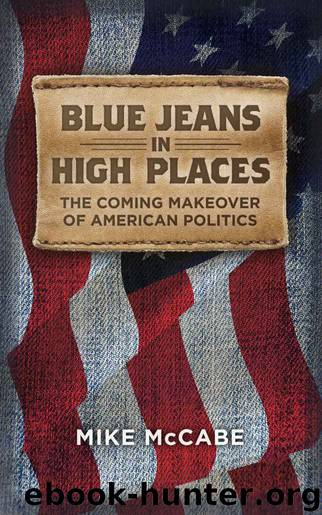Blue Jeans in High Places: The Coming Makeover of American Politics by Mike McCabe

Author:Mike McCabe [McCabe, Mike]
Language: eng
Format: epub
Publisher: Little Creek Press
Published: 2014-08-14T00:00:00+00:00
Chapter 10
Finding The Missing R
Inventing a new political identity and, more importantly, a new political household for American commoners are necessary for renewal of our ailing democracy, but are not sufficient. These steps must be followed by at least six others. The next six chapters are devoted to describing them.
First things first. As a people, we need to come to terms with the desecration of the First Amendment. This cherished possession of all Americans is a mere 45 words long, but a lot is packed into those 45 words. The First Amendment to the U.S. Constitution guarantees all of us five basic freedoms—the freedom of speech, freedom of religion, freedom of the press, the right to peaceably assemble, and the right to petition your government.
All five have endured beatings over the years. But it is the freedom of speech whose condition is most critical. The declining health of the right to speak has not come about overnight. For a great many Americans, however, a light bulb went on in 2010 when the Supreme Court dropped a bomb on the electoral landscape with its decision in Citizens United v. Federal Election Commission giving the nation’s ultra-wealthy a virtual monopoly on political speech. That ruling has ignited something of a firestorm, with voters of every political stripe united in overwhelming opposition and a growing movement pushing nationwide for a constitutional amendment overturning the decision.1 But the assault on the First Amendment did not start with Citizens United. And it does not end there.
As discussed in chapters 4 and 5, the Supreme Court radically reinterpreted the meaning of those 45 words starting in 1976. The First Amendment was already 185 years old when the nation’s highest court, ruling in Buckley v. Valeo, equated money with speech. The word “money” does not appear among the 45 words, but the court effectively inserted it.
Money is many things, but it is not a synonym for speech. It is an asset or property. It is a measure of the value of goods or services. It is even a means of amplifying the volume of speech. But it is not speech itself.
Beginning in 1976, the commercialization of speech commenced in earnest and a central First Amendment right started to transform into a commodity. It ceased to be a right and started becoming a privilege that must be purchased at great expense.
In 2010 the court built on Buckley with its decision in Citizens United v. FEC, marrying two legal doctrines to draw the conclusion that corporations, unions and other interest groups can spend as much as they want to influence American elections. It is important to understand that the court did not rule there can be no limit on what the people who run corporations, unions and advocacy organizations spend to sway voters. The court decided the things themselves could not be restricted.
The legal theories that were wedded in Citizens United included the money-is-speech doctrine from Buckley and the idea that corporations are people, a proposition whose genesis can be traced back to an 1886 case, Santa Clara County v.
Download
This site does not store any files on its server. We only index and link to content provided by other sites. Please contact the content providers to delete copyright contents if any and email us, we'll remove relevant links or contents immediately.
The Secret History by Donna Tartt(16609)
The Social Justice Warrior Handbook by Lisa De Pasquale(11485)
Thirteen Reasons Why by Jay Asher(7782)
This Is How You Lose Her by Junot Diaz(5753)
Weapons of Math Destruction by Cathy O'Neil(5029)
Zero to One by Peter Thiel(4817)
The Myth of the Strong Leader by Archie Brown(4785)
Promise Me, Dad by Joe Biden(4440)
Stone's Rules by Roger Stone(4412)
Beartown by Fredrik Backman(4404)
How Democracies Die by Steven Levitsky & Daniel Ziblatt(4392)
The Fire Next Time by James Baldwin(4336)
100 Deadly Skills by Clint Emerson(4070)
A Higher Loyalty: Truth, Lies, and Leadership by James Comey(4025)
Rise and Kill First by Ronen Bergman(4008)
The David Icke Guide to the Global Conspiracy (and how to end it) by David Icke(3875)
The Farm by Tom Rob Smith(3869)
Secrecy World by Jake Bernstein(3773)
The Doomsday Machine by Daniel Ellsberg(3725)
